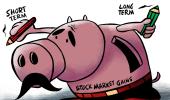'Markets could face uncertainty in the short to medium term.'
'It would be prudent to invest in alternative asset classes, especially debt, for about a year.'
'Bank fixed deposits are offering rates as high as 9 per cent per annum and these can be used as a great hedging tool until equity markets stabilise.'

It has been a topsy-turvy two months for Indian equity markets.
Nischal Maheshwari, chief executive officer for institutional equities at Centrum Broking, in conversation with Puneet Wadhwa/Business Standard, says the road ahead for Indian markets is contingent upon how US inflation moves and how quickly a reversal of global monetary stimulus happens.
Are risks for markets mounting?
Risks are mounting for markets, but these are largely driven by the recent sell-off in one large corporate group. In the short to medium term, risks remain high.
That said, the Indian markets rose quickly in the past 18 months due to available excess liquidity.
Now that liquidity is being taken out, we are seeing consolidation, rather than a downfall, owing to our resilience.
Profit margins for Indian companies are likely to improve as input costs have stabilised since last year and multiple sectors are poised for strong capacity expansion.
While market technicals -- in the short to medium term -- may remain uncertain, it does not take away strong growth prospects for the Indian economy.
I don't think the Indian markets will enter bear territory any time soon.
To what extent is a much tighter-than-expected monetary policy by global central banks priced in?
I believe the global central banks will tread the path of keeping rates 'higher for longer', owing to surging inflation.
This will have a ripple effect on markets the world over.
Consumption-driven countries, such as the US and Europe, could slip into a degrowth phase.
In India, much of this is already priced in as foreign institutional investors (FIIs) have cashed out as much as they could and domestic institutional investors have stepped in to balance the equation.
Now, if inflation proves transitory, India could be the most coveted country to invest in and FIIs will return.
It would be safe to surmise that the markets are at a crossroads.
The road ahead for the Indian markets is contingent upon how US inflation moves and how quickly the reversal of global monetary stimulus happens.

IMAGE: Nischal Maheshwari, CEO, institutional equities, Centrum Broking.
Photograph: Courtesy Centrum Broking
Are markets factoring in too much central bank hawkishness?
Markets the world over have been surprised by the stubbornness of core inflation in the US.
Accordingly, with each reading, they are changing their interest rate outlook and perhaps perceived to be more hawkish than warranted.
This hawkishness will only be justified retrospectively when the US Federal Reserve pivots, basis the inflation outlook.
Therefore, what currently seems to be hawkishness may not be so as rates unfold.
Is it time to move away from equities to bonds and gold from a one-year perspective?
Indian markets could face uncertainty in the short to medium term.
It would be a prudent move to invest in alternative asset classes, especially debt, for about a year.
Owing to the high-interest rate regime, bank fixed deposits are offering rates as high as 9 per cent per annum and these can be used as a great hedging tool until equity markets stabilise.
Is there money to be made in mid- and small-caps in 2023?
In 2023, one needs to be more stock-specific and consider a bottom-up investing approach. We like the consumption theme.
I believe it would be prudent to have exposure to quality small- and mid-cap stocks with a strong balance sheet and earnings potential.
Small-cap stocks have underperformed in 2022, compared to large-caps.
With the sustained recovery in economic momentum and corporate earnings, investments in quality small- and mid-caps make sense.
What has been your investment strategy thus far?
We remain bullish on the consumption theme in India playing out.
While rural consumption is yet to pick up pace, we have seen the high-end, luxury segment grow exponentially.
High-end hotels, apartments, and restaurants are seeing record-high occupancies.
It is only a matter of time before rural demand jumps on the bandwagon.
We remain bullish on banks, fast-moving consumer goods, cement, automotive, and construction, while we remain underweight on information technology, commodity, and pharmaceutical due to significant dependencies on the West.
How do you see corporate earnings play out in 2023-2024 (FY24)?
Markets are factoring in an earnings growth of 20 per cent in FY24 over 2022-2023, but owing to consistent rate hikes putting pressure on growth, earnings growth could be restricted to about 12-15 per cent.
The impact of persistent inflation on rural demand is visible but seems to be stabilising now.
Urban and semi-urban demand, too, have remained steady.
With India expected to maintain a 6 per cent growth rate in FY24, a recession is unlikely.
Feature Presentation: Rajesh Alva/Rediff.com












 © 2025
© 2025